SUMMARY
1. Although the Law “On Election of People's Deputies of Ukraine” in general allows to hold early parliamentary elections according to international standards, a number of important issues of the election process are not regulated at all, and some of the existing provisions of the law should be improved. In particular, the law does not give the complete answer to the questions of safety assurance for election commissions, transportation of election documentation, voting, vote counting and tabulation in areas controlled by the separatists. The Parliament should immediately submit changes to the Law “On Elections of People's Deputies of Ukraine” that will strengthen security measures during organization of elections in problem areas and allow the CEC to consider these elections failed if the electoral process does not comply with the legislation on election and international standards.
2. The main challenge of early elections is possible disruption in most districts in Donetsk and Luhansk oblasts. Issues of preventing any further attempts to disrupt the elections in districts located in Donetsk and Luhansk oblasts controlled by Ukrainian authorities and districts bordering Donetsk, Luhansk oblasts and Autonomous Republic of Crimea are also important. Ministry of Internal Affairs (MIA), Security Service of Ukraine (SSU) and the Ministry of Defence of Ukraine should carefully analyze existing and potential risks to the electoral process within these regions and implement the plan to minimize these risks, focusing on the safety of voters.
3. The CEC carries out its activities on preparation for the early election according to the requirements of the law. Most of the acts required for the proper application of the law “On Elections of People's Deputies of Ukraine” were adopted by the CEC before the start of election process. The main problem of the CEC is the lack of sufficient financial and human resources to conduct large-scale training of commission members, processing documents submitted by potential participants of the election process for their registration on elections.
4. The work of the CEC on registration of candidates gave rise to complaints from candidates, including issues of impartiality of the CEC. Presence of such complaints is natural. On the other hand, a number of the CEC decisions on registration or on refusal of registration of candidates were reviewed in court, and the courts have not always approved the position of the CEC. Documents of some candidates and parties were inspected by the CEC more carefully than of others, which led to opposite decisions in similar cases (decisions on registration V.Khoroshkovskiy, S.Piskun etc.). In future, the CEC should work out a mechanism for interaction with the State Border Service, Ministry of Internal Affairs of Ukraine, the State Penitentiary Service that would allow quickly assess candidates' data for compliance with the Constitution before making decisions on their registration.
5. The problem of stable DEC composition is still so much urgent as it was on the presidential election of 2014. As of early October, more than a quarter of DEC members were changed, and the CEC continues to make changes in DEC composition. Frequent changes of DEC members don't contribute to proper organization of the electoral process/ It also weakens the effectiveness of training of commission members for organizational issues of elections, organised by the CEC and international donors. In future, the electoral law should be amended in order to limit opportunities to replace commission members by subjects of their nomination to commission.
6. In general DECs implement their activities according to the law. In some districts issues of material and technical support of DECs (building, transport, Internet, etc.) are still urgent. There were only some cases that DEC activities were blocked due to lack of quorum at meetings. Main violations of DECs are late submissions of copies of approves decisions and minutes of meetings to the CEC, breaking requirements to announce the results of DEC activities on newsboard, etc.
7. Candidates' registration and campaigning is still followed with unfair practices. In many districts there are so-called “technical” candidates who do not hold campaigning, the real aim of their participation in the electoral process is to retract votes from certain candidates. Registration of so-called “clones”, i.e. candidates with identical last names, and even with identical first and last names, is massive. Many candidates also changed the subjects of their nomination for election, which reveals that the party system wasn't developed enough, as well as it reveals the level of integrity of such candidates.
8. The positive moment of election 2014 is reduction of the use of administrative resources during election by parties and candidates. There only some cases that officials participate in campaign activities.
9. On the other hand, the candidates continue the active use of technology of direct and indirect bribery of voters, distributing money, goods, works and services personally or through the network of activists, as well as through their own charitable foundations, networks of specifically employed persons (“brigadiers”, etc.). Bodies of Internal Affairs should give proper legal assessment of these actions. In future administrative and criminal liability for certain actions should also be reinforced.
10. Outdoor political advertising without any initial data is quite common during parliamentary elections of 2014, which probably shows the shadow financing of election campaigns. Billboards and other political advertising media with campaigning materials without any initial data are placed by almost all main political forces.
11. Taking into account huge volume of television, radio and outdoor advertising, the cost on its production and placement was not significantly reduced compared to previous elections (total cost decreased only due to reduced duration of the electoral process). After the election, the Law “On Elections of People's Deputies of Ukraine” should be amended in order to prohibit paid political advertising on television and radio during the election process.
12. Agitation is still of very poor content and is built on speculations about war and peace, lustration and other similar topics. Meaningful discussions on directions of country development are not held by political forces.
13. The quantity of hidden political advertising in media (so-called “jeans”) is still significant.
14. The distinguish ing feature of elections in 2014 is violence towards the candidates committed by voters (ejection candidates into garbage, beating, etc.). Law enforcement bodies should carefully examine relevant cases and ensure prosecution of persons who organize and/or fulfil illegal activities, as provided by the law.
15. As during presidential election in 2014 damage of campaign materials on outdoor advertising is massive. Law enforcement authorities should take measures to create conditions for free campaigning by parties and candidates, including posting campaign materials on billboards. Destruction or damage of such materials should be a subject of proper legal assessment and bring the perpetrators to justice.
16. Cases of “black PR” against certain candidates have not yet become widespread.
17. The activities of local authorities on preparation for elections are creating appropriate conditions for election commission’s work. Bodies of State Voter Register in general can provide effective and efficient updates of voter registration database of the State Voter Register. However, these bodies do not sufficiently inform voters about the order of keeping the State Register of Voters, compiling and updating voter lists etc. In future relevant information campaigns should be planned for budgetary funding.
1. Preparation for the elections in Donetsk and Luhansk oblasts
I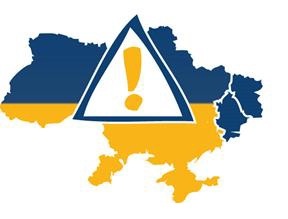 n most constituencies established in Donetsk and Luhansk oblasts it will be impossible to organize the electoral process according to international standards. As of October 3, 2014 in Donetsk oblast is completely impossible to hold elections in 10 constituencies (№№ 41, 42, 43, 44, 51, 53, 54, 55, 56, 61). It is still somewhat possible to hold elections in 11 constituencies. At the same time voting can be provided at all polling stations only in 8 constituencies (№№ 46, 47, 48, 49, 50, 57, 58, 59). In constituencies 45, 52, 53 voting is possible only at a small number of stations. In Luhansk oblast it will be impossible to hold elections in constituencies №№ 104, 109, 110, 111, as well as in 105 and 108 (Schastya town and Chernuhino town of the last two constituencies respectively are under control of Ukrainian government). In constituencies №№ 112 and 114 only 30-50% of voters will have opportunity to participate in elections. Only the territory of the constituency №106 is fully controlled by Ukraine. Thus, within Donbas elections cannot be held in 16-18 or even more (in case of pessimistic scenario) constituencies.
n most constituencies established in Donetsk and Luhansk oblasts it will be impossible to organize the electoral process according to international standards. As of October 3, 2014 in Donetsk oblast is completely impossible to hold elections in 10 constituencies (№№ 41, 42, 43, 44, 51, 53, 54, 55, 56, 61). It is still somewhat possible to hold elections in 11 constituencies. At the same time voting can be provided at all polling stations only in 8 constituencies (№№ 46, 47, 48, 49, 50, 57, 58, 59). In constituencies 45, 52, 53 voting is possible only at a small number of stations. In Luhansk oblast it will be impossible to hold elections in constituencies №№ 104, 109, 110, 111, as well as in 105 and 108 (Schastya town and Chernuhino town of the last two constituencies respectively are under control of Ukrainian government). In constituencies №№ 112 and 114 only 30-50% of voters will have opportunity to participate in elections. Only the territory of the constituency №106 is fully controlled by Ukraine. Thus, within Donbas elections cannot be held in 16-18 or even more (in case of pessimistic scenario) constituencies.
Activities of state authorities and local self-governments to prepare for elections are not coordinated enough.
We should positively estimate the work of the CEC, which changed centres of 2 constituencies in Donetsk (№№ 53 and 59) and 2 constituencies in Luhansk oblasts, although this decision of the CEC contradicts the requirements of the law and will not significantly increase in general the safety of voting and organization of election process in the relevant constituencies.
Activities of state authorities and local self-governments to prepare for elections are not coordinated enough. We should positively estimate the work of the CEC, which changed centres of 2 constituencies in Donetsk (№№ 53 and 59) and 2 constituencies in Luhansk oblasts, although this decision of the CEC contradicts the requirements of the law and will not significantly increase in general the safety of voting and organization of election process in the relevant constituencies.
The share of changes in DEC composition in Donetsk and Luhansk oblasts is still significant. In Donetsk oblast the share of changes is 35% and is likely to continue to grow. Most replacements occurred in constituencies №48 (centre - Kramatorsk), №60 (centre - Volnovakha), №46 (centre - Donetsk), №59 (centre - Maryinka), №47 (centre – Slovyansk). From 10 to 12 members of these district election commissions have been replaced, with 18 people in overall composition of each DEC. Districts № 46, 47, 48 are under the full control of Ukrainian authorities, which allows to hold early parliamentary elections in Ukraine. District № 59 is not captured by illegal armed groups, but the centre of Maryinka town is constantly exposed to attacks from them. Instead, the centre of constituency №59 Volnovakha is controlled by legitimate authority, but a great part of the town is occupied by DNR. Less changes occurred in composition of DECs №№ 56, 41, 43, 44, 54, due to the fact that these districts are controlled by Ukrainian authorities. In Luhansk oblast DEC composition changed up to 30-60%. The greatest number of changes in composition was made in DECs №№ 105, 106, 107, 112, and 113 (50 to 60%).
Proper working conditions are not created for all DECs because of fights. In Donetsk oblast in constituencies №41-45, 51, 53, 54, 55, 56, 61 DECs don't carry out their activities at all. DEC number 52 held its first meeting only at the end of September. 8 DECs work permanently: DEC №46 (Artemovsk), DEC №47 (Slovyansk), DEC №48 (Kramatorsk), DEC №50 (Krasnoarmiysk), DEC №57, 58 (Mariupol), DEC №59 (Maryinka), DEC №60 (Volnovakha). At the first meetings of these commissions there were problems with quorum, but due to massive rotations activities of commissions became more organized. Observers did not find significant violations in existing DECs of Donetsk oblast. However the level of awareness of commission members with election procedures is quite low. In Luhansk oblast DECs of constituencies №№ 104, 105, 108, 109, 110, 111 have never met, they were not provided with premises and they didn't start their work. DEC № 114 got a room on September 30, and has already started its work. DEC № 114 tried to hold meetings 8 times but failed. DECs № 106, 112, 113 received adequate rooms for their meetings and have minimum quorum.
Pre-election activities of candidates are low. In Donetsk oblast more or less appropriate campaign (on controlled by Ukraine territory) started only at the end of September. For this reason no case of violations of election laws (except of campaigning before the registration of candidates) were recorded. In Luhansk oblast candidates started pre-election campaigning. Observers of CVU in this oblast recorded the first cases of indirect bribery of voters: in constituency №112 candidate Huslavskyy came to meet voters with a gift for them – a flip chart. Other candidate - Romanovsky - during meetings with voters took orders on repair of municipal equipment, the repar was later performed by company “Romalaks”, owned by Romanovsky. Among the parties in constituencies of Luhansk oblast controlled by the Ukrainian authorities, the most active campaign is carried out by Radical Party of Oleg Lyashko.
As well as in other regions, deputies - former members of the Party of Regions faction participate in the election campaigning in 2014 primarily as self-nominated candidates. In Donetsk oblast 12 current deputies of Ukraine take part in election (all of them as self-nominated). In Luhansk oblast not only former MPs from the Party of Regions registered as self-nominated, but also the candidates who ran in previous election from other parties.
Bodies of the State Voter Register in the region work unstable. Thus, the Department of State Voter Register of Maryinka rayon state administration did not work as the city is partially surrounded by gangs that make normal work of the State Voter Register in the area impossible. Observers note the low activity of SVR departments on informing voters. Considering the number of internally displaced persons within the oblast, poor information work results in low awareness of people on opportunities of temporary change of place of voting without changing the voting address. In Luhansk oblast, city councils of Severodonetsk, Lysychansk, and Rubizhne posted information on changing the place of voting on their Web sites and determined the locations for campaign materials. Luhansk oblast state administration collected information on the cost of political advertising. However, bodies of local self-government don't provide any help to DECs in exercising their powers.
2. Activities of the CEC
2.1. Registration of candidates for People's Deputies
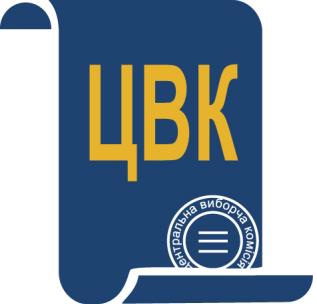
According to the Law “On Elections of People's Deputies of Ukraine” the CEC completed registration of candidates on September 30, 2014. As of October 4, the CEC registered 6627 candidates for people's deputies of Ukraine, including 3493 candidates in single-seat constituencies (1401 of them were candidates nominated by parties and 2092 self-nominated candidates). Parliamentary candidates in the national constituency were nominated by 29 parties. More than 800 potential candidates were refused in registration by the CEC. The main reason for refusal in registration were incorrectly filed documents for registration of candidates (absence of necessary required by law information in autobiography, incorrect dating of applications for registration, the lack of necessary information in applications, submitting photos of other size than specified by election laws, exceeding established volume of election program, etc. ), as well as the lack of necessary documents (document confirming payment of monetary deposit, etc.). As in previous elections in 2012, the CEC considered documents, which did not contain information specified by the law, or non-compliance of submitted documents with the applicable requirements as non-submission of these documents. In individual cases, the CEC refused to register candidates as they didn't reach 21 years old or due to simultaneous nomination in national and single-seat constituencies. Some decisions to refuse registration of candidates were challenged in court. In some cases courts supported position of the CEC, in others - the plaintiffs. However, if claims against the CEC were satisfied by court, CEC performed the relevant court decisions. As in the case of cancelling the registration of candidates (see below.), a number of electoral subjects complained that the CEC selectively evaluated the documents submitted for registration, identifying deficiencies in documents of some candidates and ignoring shortcomings in documents of the others. A possible reason for the selective law enforcement of the CEC may be a lack of funding and limited human capabilities for checking documents of several thousand candidates.
As of October 4, 2014 the CEC cancelled the registration of 28 parliamentary candidates. The main reason for cancelling the registration of candidates was the submission of applications for refusal from nomination. In two cases the registration of candidates was cancelled due to not cancelled convictions. The most problematic aspect of the registration of candidates for People's Deputies of Ukraine was the CEC ambiguous interpretation of the Constitution and the Law “On Elections of People's Deputies of Ukraine” for the term of accommodation of potential candidate for deputy on the territory of Ukraine: in some cases the CEC did not "notice" the fact that a potential parliamentary candidates didn't reside on the territory of Ukraine for the last 5 years, while in other cases candidates were refused registration due to the fact that during last 5 years they didn't reside in the state. For example, the CEC resolution № 1093 from September 23, 2014 registered candidates for People's Deputies of Ukraine included to the electoral list of candidates for deputies of Ukraine from Serhiy Tigipko's party "Strong Ukraine", including Khoroshkovsky V.I., who left Ukraine in 2012. Polyakov V.L., included to the electoral list of the same party, resided (according to media) for a long time in the United Kingdom and in France. Hurzhos V.M. – another candidate for deputy from "Strong Ukraine" - lived in Malta since election of Viktor Yanukovych for President.1 On the other hand, the CEC refused to register a candidate for People's Deputy of Ukraine Onishchenko O.R. (the CEC resolution № 960 from September 16, 2014) due to the fact that he didn't reside in Ukraine for the last 5 years. In resolution № 1084 from September 23, 2014 the CEC refused to register a candidate for People's Deputy of Ukraine Horodetsky A.E. nominated by the party "People's Front" and the in resolution № 1092 from September 23, 2014 refused to register Piskun S.M., who left the Ukraine in 2012 as well as Khoroshkovsky V.I. Although in the last three cases the decisions to refuse the registration of candidates were made on the basis of the reports of the State Border Service, it is still unclear why the CEC didn't request the official data from the State Border Service, as information that Khoroshkovsky V.I. spent 2013 living outside Ukraine was published in Mass Media.
We should mention that cases of selective or controversial application of the law by CEC on registration or refusal in registration of candidates due to the fact that they didn't reside on the territory of Ukraine within the required term happened also during parliamentary elections in 2012. It confirms the need to define the “permanent residence in Ukraine” in the Law “On Elections of People's Deputies of Ukraine”.
Another problematic aspect of candidates' registration was refusal to register candidates for People's Deputies of Ukraine in single-seat constituencies nominated by the political party “Volia” (the CEC resolution № 1075 from September 22, 2014). This resolution refused in registration to a number of candidates for deputies of Ukraine from the party “Volia” due to the fact that the decision of the governing body of the party was not signed by authorized persons and wasn't confirmed with the seal of the party. The party “Volia” challenged the CEC resolution in court and this resolution was cancelled by Kyiv Administrative Court decision.
2.2. Changes in DEC composition September 5, 2014 the CEC adopted a resolution № 858 “On Establishment of district election commissions for elections of People’s Deputies of Ukraine”. This resolution formed 213 DECs which had to organize elections on the territory of Ukraine, except the Autonomous Republic of Crimea and Sevastopol, which are temporarily occupied by Russian Federation.
September 5, 2014 the CEC adopted a resolution № 858 “On Establishment of district election commissions for elections of People’s Deputies of Ukraine”. This resolution formed 213 DECs which had to organize elections on the territory of Ukraine, except the Autonomous Republic of Crimea and Sevastopol, which are temporarily occupied by Russian Federation.
Since September, 5 till October, 4 2014 the CEC adopted 20 resolutions (resolutions №№ 884, 906, 918, 932, 950, 966, 980, 1008, 1045, 1079, 1112, 1133, 1167, 1222, 1260, 1297, 1348, 1401, 1427, 1460) on changes in DEC composition, which replaced almost 1000 DEC members. In general, changes in DEC composition reached almost 25% from their primary composition as of beginning of October 2014. Most replacements of DEC members were made in Donetsk, Luhansk, Dnipropetrovs’k, Lviv and Odesa oblasts, and the lowest number of rotations was observed in Volyn, Zhytomyr and Ternopil oblasts. Frequent replacements of DEC members, which are still not as mass as in 2012, greatly weaken the role of DECs in proper preparation for the parliamentary election in Ukraine and reduce the effectiveness of training activities on the election process for commission members conducted by the CEC together with international donors. Working on changes to the electoral law the Parliament should consider the mechanisms aimed to narrow possibilities for substitution in DECs by proper election subjects. The following table summarizes the statistics on replacements of DEC members in period from formation of the DEC till October 3, 2014.
3. Activities of DEC
 Long-term observers of CVU recorded just single cases of violation of the law by DECs. For example, DEC № 193 decided that head and the secretary of the DEC will perform their duties free of charge, while the list of paid employed staff included deputy head and several members. The situation was corrected only after the intervention of the CEC. Some commissions do not respect the law requirements for disclosure of their decisions on information boards located on the premises of the DEC. These are, for example, DECs №215 (Kyiv) and №68 (Zakarpattia oblast). Analysis of the information provided on the CEC website allows us to suggest that not all DECs send their decisions to the CEC for posting on the CEC official website, or that the CEC does not disclose decisions of certain DECs. For example, the CEC web-site doesn't contain any decisions of DECs №№ 16, 22, 23, 25, 29, 30, 34, 65, 67, 69, 71, 73, 76, 84, 87, 93, 96, 98, 100, 122, 123, 124, 131, 132, 135, 138, 144, 145, 146, 147, 150, 154, 156, 158, 159, 165, 166, 167, 180, 191, 195, 197, 198, 199, 201, 209. Data analysis of the CEC web-site allows also conclusion that provisions of the Law “On election of People's Deputies of Ukraine” on disclosure protocols of commission meetings on the CEC web-site are systematically violated. Definite influence of certain political forces on DEC activities is not observed. At the same time, according to CVU long-term observers, DECs in some oblasts are in fact controlled by Block of Petro Poroshenko (Chernivtsi, Lviv (DECs №№ 115, 116) oblasts) or political parties formed on the basis of the Party of Regions, including "Strong Ukraine" (Dnipropetrovs’k oblast). In some regions Petro Poroshenko Block and parties formed on the basis of the Party of Regions have approximately the same influence on DECs (Ivano-Frankivsk, Kherson oblasts). In Kyiv oblast commission members are mainly controlled by Radical Party of Oleg Lyashko, Petro Poroshenko Bloc and “Batkivschyna”, which are parties of democratic course. In Vinnytsia oblast several competing parties are trying to get secret control on the work of the DECs – Petro Poroshenko Block and “Batkivschyna”. It's especially about the DEC №12, where the son of the current President of Ukraine O.Poroshenko is nominated. In Odesa oblast DECs are more under candidates' control than under party's control. For example, after replacements newly appointed commission members seem to be connected to the candidates for deputies: in DEC № 135 – to Serhiy Kivalov (self-nominated), DEC №137 - to Valery Ponepalyuk (Petro Poroshenko Block), in DEC №139 – to Oleksander Presman (self-nominated), in DEC №141 – to Vitaly Barvinenko (selfnominated).
Long-term observers of CVU recorded just single cases of violation of the law by DECs. For example, DEC № 193 decided that head and the secretary of the DEC will perform their duties free of charge, while the list of paid employed staff included deputy head and several members. The situation was corrected only after the intervention of the CEC. Some commissions do not respect the law requirements for disclosure of their decisions on information boards located on the premises of the DEC. These are, for example, DECs №215 (Kyiv) and №68 (Zakarpattia oblast). Analysis of the information provided on the CEC website allows us to suggest that not all DECs send their decisions to the CEC for posting on the CEC official website, or that the CEC does not disclose decisions of certain DECs. For example, the CEC web-site doesn't contain any decisions of DECs №№ 16, 22, 23, 25, 29, 30, 34, 65, 67, 69, 71, 73, 76, 84, 87, 93, 96, 98, 100, 122, 123, 124, 131, 132, 135, 138, 144, 145, 146, 147, 150, 154, 156, 158, 159, 165, 166, 167, 180, 191, 195, 197, 198, 199, 201, 209. Data analysis of the CEC web-site allows also conclusion that provisions of the Law “On election of People's Deputies of Ukraine” on disclosure protocols of commission meetings on the CEC web-site are systematically violated. Definite influence of certain political forces on DEC activities is not observed. At the same time, according to CVU long-term observers, DECs in some oblasts are in fact controlled by Block of Petro Poroshenko (Chernivtsi, Lviv (DECs №№ 115, 116) oblasts) or political parties formed on the basis of the Party of Regions, including "Strong Ukraine" (Dnipropetrovs’k oblast). In some regions Petro Poroshenko Block and parties formed on the basis of the Party of Regions have approximately the same influence on DECs (Ivano-Frankivsk, Kherson oblasts). In Kyiv oblast commission members are mainly controlled by Radical Party of Oleg Lyashko, Petro Poroshenko Bloc and “Batkivschyna”, which are parties of democratic course. In Vinnytsia oblast several competing parties are trying to get secret control on the work of the DECs – Petro Poroshenko Block and “Batkivschyna”. It's especially about the DEC №12, where the son of the current President of Ukraine O.Poroshenko is nominated. In Odesa oblast DECs are more under candidates' control than under party's control. For example, after replacements newly appointed commission members seem to be connected to the candidates for deputies: in DEC № 135 – to Serhiy Kivalov (self-nominated), DEC №137 - to Valery Ponepalyuk (Petro Poroshenko Block), in DEC №139 – to Oleksander Presman (self-nominated), in DEC №141 – to Vitaly Barvinenko (selfnominated).
Some DECs still have problems of attendance of meetings by commission members and of quorum at meeting. For example problems of meeting attendance are actual for DECs ОВК №№ 68, 69, 70, 71 (Zakarpattia oblast), № 142 (Odesa oblast), № 127 (Mykolaiv oblast). In Dnipropetrovs’k oblast DEC № 28 experiences difficulties in work as since time of formation 10 of the 18 commission members were replaced. In Kyiv oblast (DEC № 98) could not hold meetings for some time as commission heads were absent or refused to perform their duties. In some constituencies problems of material and technical support of DEC's work are still not fully resolved, although authorities take certain measures. Thus, in Kherson oblast (constituencies №№ 184, 185, 186) DECs were not provided with fuel. In DEC №190 (Khmelnitsky oblast) there were no copying machine A3; the DEC was provided only with 2 computers instead of 4. In Lviv oblast in many DECs there are no information boards, where DEC decisions should be published. Problems of material and technical support are urgent for DECs in Mykolaiv oblast (lack of computer equipment, lack of funds for making voting booths). The DEC № 14 (Vinnytsia oblast) continues to hold its meetings in the gym; or in other words - problems of material and technical support of this commission were not solved during September. In DEC № 67 (Zhytomyr oblast) there is still no Internet connection. In DEC № 19 (Volyn oblast) commission was not provided with vehicle (although this problem will be solved soon) and DEC № 21 (Volyn oblast) was allocated in a room which doesn't meet standards on square and sanitary standards. DEC №181 in Kharkiv oblast, DEC №202 in Chernivtsi oblast, DEC №190 in Khmelnitsky oblast also do not meet regulatory requirements. In general, there are no reasons to doubt that DECs will provide proper organization of electoral processes within single-seat constituencies (except Donetsk and Luhansk oblasts).
4. Registration of candidates
The quantity of candidates for early parliamentary elections in Ukraine remains significant. Thus, in 48 constituencies out of 213, where elections will be held, there are 20 or more parliamentary candidates registered. In 9 constituencies the number of candidates is from 30 to 40 people (constituencies №№ 47, 66, 92, 93, 97, 133, 141, 217, 223). In 6 constituencies (№№ 96, 106, 107, 112, 114, 135) there are 40 or more candidates registered. The largest number of majoritarian candidates is registered in constituency №96, where 50 candidates for deputies are registered. Despite the risks of disrupting the election in most constituencies of Donetsk and Luhansk oblasts, in all constituencies established in these oblasts at least 4 candidates are registered. In this context we should mention that 4 of 6 constituencies, where 40 or more candidates are registered, are located exactly in Luhansk oblast. During early parliamentary elections in Ukraine there were several cases of obstruction of registration of candidates for People’s Deputies of Ukraine. In particular, a potential candidate for election V.Pylypyshyn was thrown into the tank for garbage by citizens that did not allow him to apply on the day of the scheduled application. Such actions have signs of criminally punishable acts.
Traditionally, in many single-seat constituencies there are so-called “doubles” or “clones” of famous politicians, in other words persons with similar last names, sometimes – with similar first names and patronymic. Some “clones” were refused in registration by the CEC on formal reasons, but some of them still were registered. For example, in Cherkasy oblast in constituency №197, two candidates with the last name Datsenko were registered. In constituency №195 and №198 (Cherkasy oblast) “clones” of candidates Zubyk and Timoshenko attempted to register, but they were denied of registration. In constituencies №№ 168, 169, 170 (Kharkiv oblast) several candidates with names Pisarenko, Kosinov, Rodzinskyy are registered. In constituency № 184 (Kherson oblast) two candidates with the same last name Vinnyk run in election. In Khmelnytsky oblast “twins” of candidates - current deputies of Ukraine - V. Bondar, V.Kolischak were registered in constituencies №№ 191 and 188 respectively. In constituencies №№ 99, 101 and 102 (Kirovohrad oblast) there are 2 candidates with last name Tabalov, 2 candidates with name Poplawski and 4 candidates with name Boyko were registered. In constituency №95 (Kyiv oblast) “clone” of high-rating candidate V.Romanyuk was registered, and in constituency №147 (Poltava oblast) the CEC registered two candidates with last name Kulinych. In Rivne oblast former head of local branch of the Party of Regions changed his first name and last name and participates in elections as Oleg Lyashko (constituency №154). Several “clones” of high-rating candidates also registered in constituencies №№ 157 and 159 (Sumy oblast). Former members of the Party of Regions ballot mainly through self-nomination and hide the facts of their vote for the “dictatorial laws” on January 16, 2014. This practice is large scale in Dnipropetrovs’k, Kyiv, Mykolaiv, Odesa, Rivne, Sumy, Kharkiv, Kherson, Khmelnytsky, Cherkasy, Chernivtsi, Chernihiv and other oblasts. Compared to elections in 2012 many candidates changed the subject of their nomination for election. In particular, many candidates of “Batkivschyna” in 2014 were nominated by “People's Front”. For example, in constituency №201 (Chernivtsi oblast) deputy M.Fedoruk run in election not from “Batkivschyna” (as in 2012), but from “People's Front”. In constituency № 202 (Chernivtsi oblast) deputy O.Fyschuk, who was nominated by “Batkivschyna” in 2012, was nominated by “People's Front” in 2014. In Kherson oblast former representatives of “Batkivschyna” V.Bohdanov and Y.Terletskyy ballot as self-nominated. In constituency №115 (Lviv oblast) candidate for deputy D. Dobrodomov in 2012 was nominated from UDAR, and in 2014 he is self-nominated. In constituencies № №№ 122 and 123 (Lviv oblast) V.Pazynyak and L.Kotelyak (respectively) in 2012 were nominated by “Batkivschyna”, while in elections of 2014 they are nominated from “People's Front”. In constituency №157 (Sumy oblast) parliamentary candidates from “People's Front” nominated O.Medunytsa who in the elections of 2012 was nominated from “Batkivschyna”.
5. The qualitative composition of the future parliament (national constituency)
As the registration of parliamentary candidates is finished, the CVU decided to analyze the
candidates proposed to voters and to forecast the qualitative composition of the Verkhovna Rada of Ukraine of VIII convocation. In this report we analyze the national constituency.
In this analysis the CVU used data of polls made by sociological companies SOCIS from 15.09.2014 and KIIS from 29.09.2014. According to these polls, we identified six parties which at the time of polls had the chance to pass to the Verkhovna Rada of Ukraine and analyzed their lists in the national constituency to discover how many old and new faces can pass to the Parliament from these parties. Candidates, who previously were MPs, were checked for participation in voting for the "dictatorial" laws on January 16, 2014 and violation of "Chesno" Movement criteria on corruption and human rights violations. Candidates, who previously have never been MPs, were divided into different categories according to their main professional field before getting nominated on this election. We hope that this division will allow forecasting the qualitative composition of the parliament which will be elected by voters on October 26, 2014.
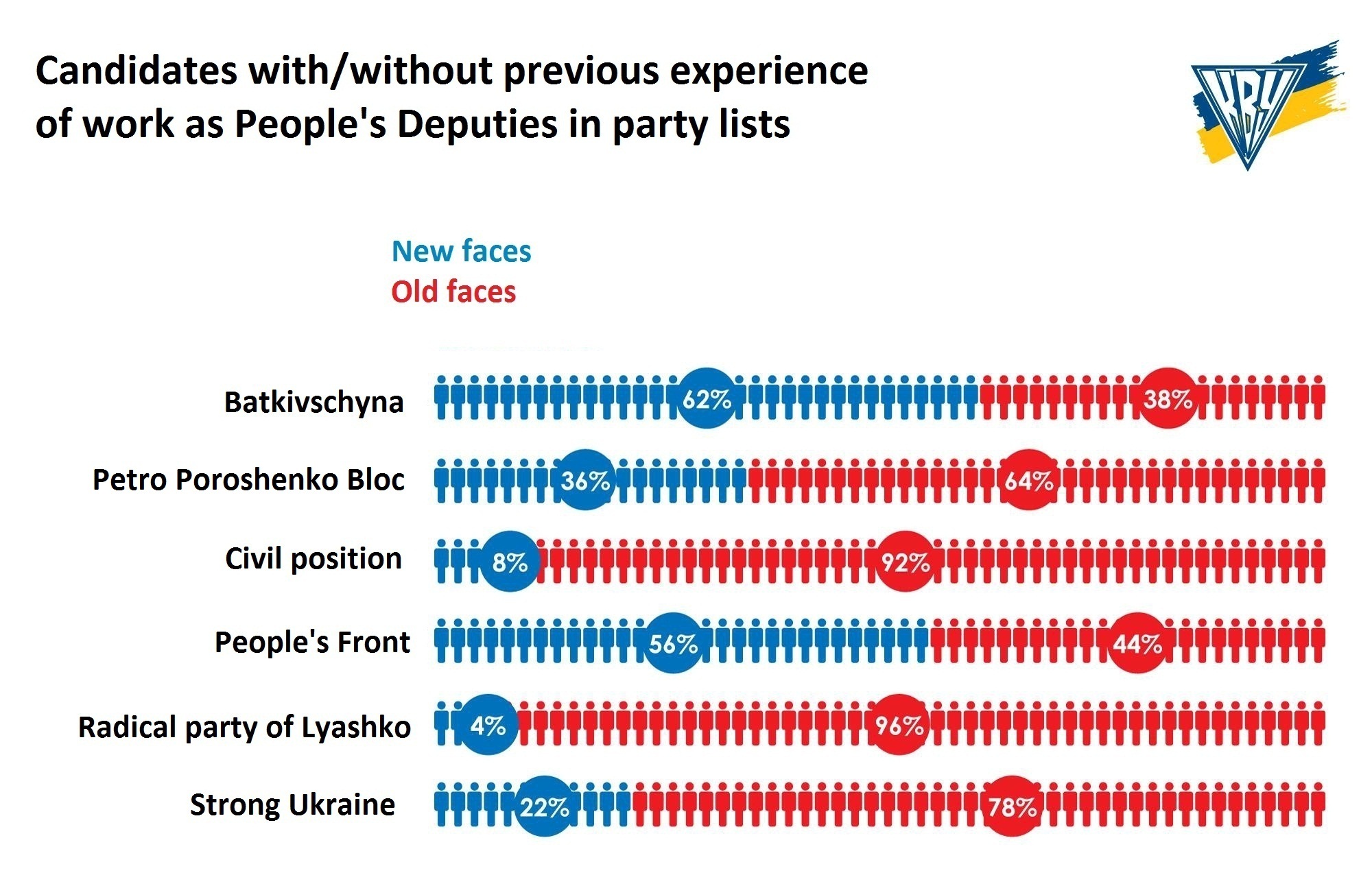
Main conclusions:
Candidates with previous experience of work as People's Deputies – «old faces»:
In party «Batkivschyna» - 62%, 32% of them are corrupt according to the criteria of CHESNO
movement, 68% are other former deputies In party «PPB» - 36%, 21% of them don't meet criteria of CHESNO movement, 79% are other former deputies
In party «Civil position» - 8%, 25% of them don't meet criteria of CHESNO movement, 75% are
other former deputies
In party «People's Front» - 56%, 15% of them don't meet criteria of CHESNO movement, 85% are other former deputies
In party «Radical party of Lyashko» - 4%, 50% of them (one person) don't meet criteria of CHESNO movement, 96% are other former deputies
In party «Strong Ukraine» - 22%, 92% of them don't meet criteria of CHESNO movement, 8% are other former deputies
Candidates without previous experience of work as People's Deputies – «new faces»: In party «Batkivschyna» - 39% - officials / local self-government, 30% - activists / journalists, 9% - military men
In party «PPB» - 29% - officials / local self-government, 16% - activists / journalists, 2% - military
men, 39% - business / lawyers
In party «Civil position» - 16% - officials / local self-government, 14% - activists / journalists, 2% - military men, 33% - business / lawyers, 18% - other candidates
In party «People's Front» - 42% - officials / local self-government, 17% - activists / journalists, 25% - military men, 33% - business / lawyers, 8% - other candidates
In party «Radical party of Lyashko» - 9% - officials / local self-government, 9% - activists /
journalists, 6% - military men, 26% - business / lawyers, 45% - other candidates
In party «Strong Ukraine» - 29% - officials / local self-government, 9% - activists / journalists, 6% - military men, 34% - business / lawyers, 26% - other candidates
Most “new faces” in the new parliament from the lists will be: businessmen / lawyers - 30%, 24% - officials and local self-government, 20% (which is too much) will be other candidates (retired, temporarily unemployed, etc.), 14% of journalists / activists. Old faces - 70% of ex-MPs, 30% of them don't meet criteria of CHESNO movement.
According to preliminary analysis of nominees in majoritarian constituencies many MPs of previous convocations and those who voted for laws of the 16th of January, almost in every constituency there are deputies of past convocations - detailed analysis of the quality of the main contenders for parliamentary seats will be published by CVU in the coming days.
6. The election Campaigning

The vast majority of main parties (Petro Poroshenko Bloc, Batkivschyna, People's Front, “Strong Ukraine” etc.) started campaigning before registration of nominated candidates in national constituency. Positive moment of the early parliamentary elections is reducing the use of administrative resources by parties and candidates. There are just few single cases of involving officials and servants of public authorities in campaigning. For example, in constituency №207 (Chernihiv oblast) the head of Chernihiv oblast council and the head of Semenivka rayon state administration participated in a meeting, where campaigning against the current deputy I.Rybakov was carried out, on September 23, 2014 in Koryukivka town. In Kherson oblast acting Kherson mayor, a member of “Batkivschyna” Vladimir Mykolayenko (elected in special election of mayor in May 2014) accompanying campaigning activities of People's Deputy of Ukraine from “Batkivschyna” and parliamentary candidate in constituency № 182 Yuri Odarchenko. There were even posters located in the city depicting V.Mykolayenko and Y.Odarchenko together and saying “One team”. Acting head of Kherson rayon state administration Andriy Putilov is followed in trips by candidate for people's deputy from Petro Poroshenko Bloc in constituency № 185 Serhiy Khlan. In Kyiv oblast campaign materials of parties “Zastup”, “Young Ukraine” are distributed by officials of local selfgovernment. Deputy head of Rozdilnyanska district council is always present on meetings of selfnominated candidate in constituency №139 (Odesa oblast) Oleksander Presman and the candidate from “Strong Ukraine” in constituency №143 Oleksander Urbanskiy participates in all official events of Ismail mayor.
official events of Ismail mayor.
The scale of indirect bribery of voters by parties and candidates is still significant. In particular, in Cherkasy oblast were some cases of distribution of food packages to voters with advertising materials for N.Netovkina (constituency №195). In the same constituency another candidate for deputy V.Zubyk organized free tours for voter to monasteries. In constituency № 200 (Cherkasy oblast) “godfather of Tender Chamber” A.Yatsenko actively helps to village communities in developing local infrastructure. Food sets from candidates are actively distributed to voters of Kharkiv. Thus, in constituency №169 food packages are distributed on behalf of parliamentary candidate V.Skorobahach, and in constituency №170 - on behalf of candidate V.Homutynnik.
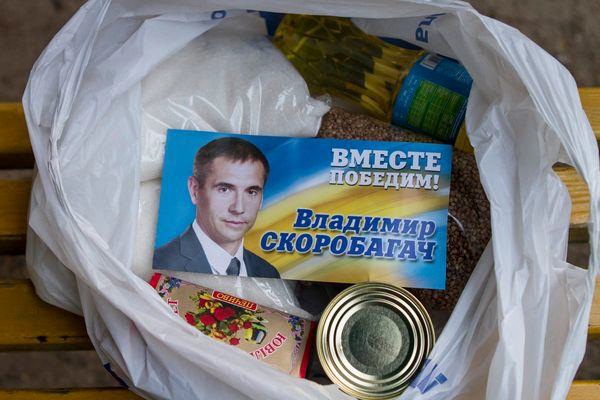
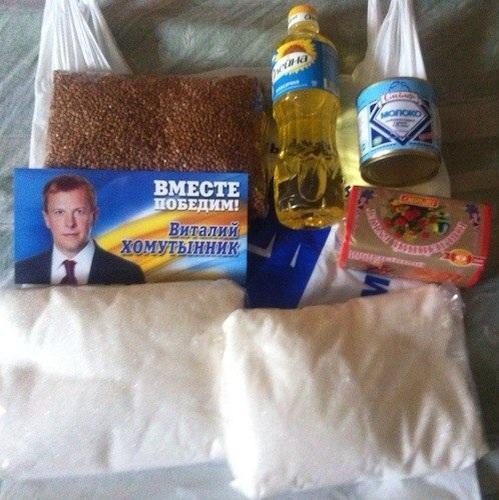
In Kherson oblast cases of indirect bribery of voters happen in all constituencies, though extent of indirect bribery of voters in this oblast decreased in comparison with 2012. In this oblast indirect bribery is actively exercised mainly by current MPs of Ukraine. For example, V.Saldo who is running for constituency № 182, modernizes roads between houses, repairs playgrounds etc. In constituency №184, where deputy director of PJSC “House of vintage cognac “Tavria” H.Horkun is nominated, “Tavria” promoted the “Harvest Festival”. In Kirovohrad oblast indirect bribery of voters was massively used for candidates O.Dovhyy, M.Poplavskyy, S.Berezkin, L.Onul. In constituency № 135 (Odesa oblast) candidates for Deputy S. Kivalov organized a concert with a banquet for voters, during which campaigning videos in support of the candidate were broadcasted. In constituency №136 (Odessa oblast) campaigning leaflets giving discounts at pharmacies were distributed on behalf of the candidate V.Skoblenko. In constituency №139 (Odesa oblast) funds for building a church in Olexandrivka of Rozdilnjansky rayon were transferred, and the village school was provided with 2 multimedia projectors and specialized equipment for physics on behalf of self-nominated candidate Oleksander Presman. In constituency № 23 (Volyn oblast) the candidate for deputy I.Yeremyeyev handed gifts and cash benefits to voters during campaign meeting with voters in Pokaschiv village.
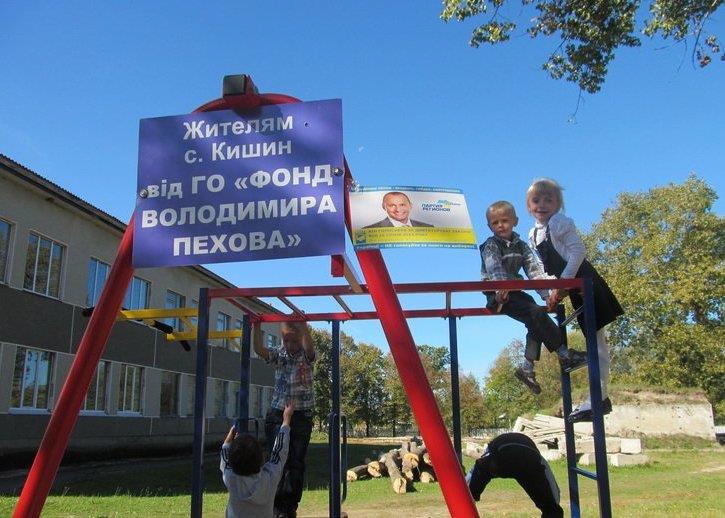 As during elections of 2012 parliamentary candidates actively use their own (or affiliated) charitable foundations for indirect bribery of voters. For example, in constituency № 195 (Cherkasy oblast) charitable foundation of V.Zubyk gave money to voters. In constituency № 138 (Odesa oblast) charitable foundation of I.Fursin who is running for election in 2014 in this constituency, purchased sets of uniforms for Odessa 28 Mechanized Brigade, and made a contribution to the restoration of the temple in Ananyiv town. In constituency № 79 (Zaporizhzhya oblast) MP candidate Volodymyr Bandurov has charitable foundation “Under cover of Virgin”, which implements the program “Calmness and safety on the native land”. Oleksander Dudok charitable foundation “For development of native land” (constituency №82, Zaporizhzhya oblast) provided residents of Pology rayon with money - 605 thousand UAH to recover 39 social facilities (including 23 schools), which required repair and to purchase essential household items etc.
As during elections of 2012 parliamentary candidates actively use their own (or affiliated) charitable foundations for indirect bribery of voters. For example, in constituency № 195 (Cherkasy oblast) charitable foundation of V.Zubyk gave money to voters. In constituency № 138 (Odesa oblast) charitable foundation of I.Fursin who is running for election in 2014 in this constituency, purchased sets of uniforms for Odessa 28 Mechanized Brigade, and made a contribution to the restoration of the temple in Ananyiv town. In constituency № 79 (Zaporizhzhya oblast) MP candidate Volodymyr Bandurov has charitable foundation “Under cover of Virgin”, which implements the program “Calmness and safety on the native land”. Oleksander Dudok charitable foundation “For development of native land” (constituency №82, Zaporizhzhya oblast) provided residents of Pology rayon with money - 605 thousand UAH to recover 39 social facilities (including 23 schools), which required repair and to purchase essential household items etc.
The same as during regular elections of people's deputies of Ukraine, a quite popular mechanism for mobilizing voters to support certain candidates is signing “social contracts” between candidates (or on their behalf) and voters. Signing of these agreements was observed in constituency №207 (Chernihiv oblast) in interests of parliamentary candidate I.Rybakov.
Similar scheme is used by S. Blyzniuk in constituency № 48 (Donetsk oblast), where the “pyramid” to bribe voters is created. People sign social contracts, in which they undertake to support the candidacy of Blyzniuk, and in return they receive a cash reward. In case voters involve new “clients” into the pyramid their remuneration increases. LTOs of CVU also recorded cases of direct bribery of voters. Thus, in Petryky village and in Zhuravka village of Horodyschenskyy rayon of Cherkasy oblast there were cases of bribery of voters - 100 UAH were given to voters in order that they vote for the party "Zastup", more was promised to be paid after election. The network of "brigadiers" was created for bribing voters. In general, in this oblast the cases of direct bribery of voters were recorded in constituencies №№ 195, 198, 200 of Cherkasy oblast. As in previous elections, campaigning of candidates and parties is poor in content and often built on speculations on the military and lustration topics. Slogans are “Ukraine will win” (“Batkivschyna”), “Putin - hu..lo. Good will win” (Radical Party of Oleg Lyashko), “A strong team for difficult times” (“People's Front”), “Protect Ukraine and help the army” ("Civil Position”). Internet Party actively places billboards with pictures of “candidates” - the heroes of the movie “Star Wars” with text messages “Going to the Parliament we greet You”, depicting Darth Vader and saying “Officer. Politician. Father”, “Candidate with human face” etc.
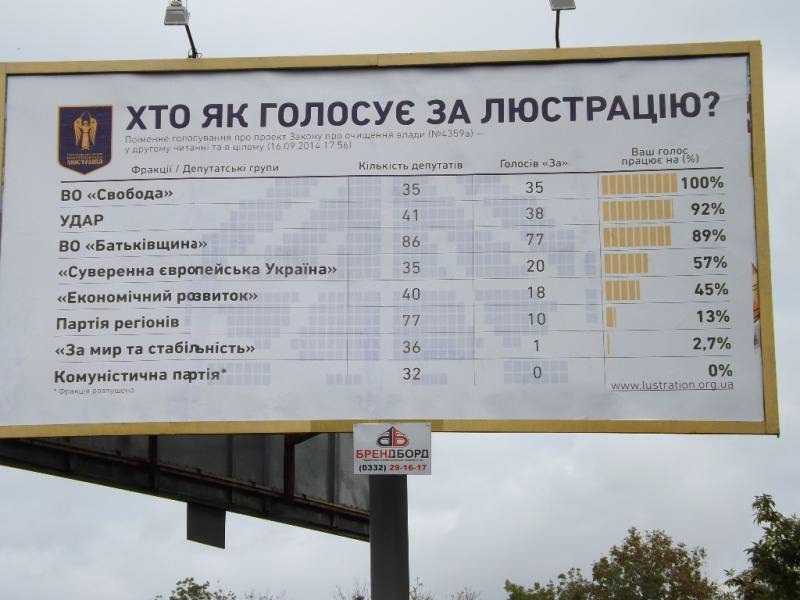
Hidden political advertising, or socalled “jeans”, is still quite popular. In Cherkasy oblast “Accent” edition does not indicate political advertising and is a leader in placing “jeans” in the region. In this oblast another leading edition on placement of sponsored political materials is “Vechirni Cherkasy”. In other regions the situation is similar. The leaders on placing “jeans” are “Batkivschyna” and “Strong Ukraine”, although other parties and the vast majority of majoritarian candidates actively place hidden political advertising in the media too.
The widespread violations of election campaign are placing political outdoor advertising without input data (ordering customer, circulation, printing-office, etc.) In Kyiv almost all billboards with political advertising for Petro Poroshenko Bloc, VO "Batkivschyna", and “Strong Ukraine” were placed without any input data. In Chernivtsi observers detected a lot of city-lights with advertising of “Opposition Bloc”, which also didn't contain any input data. These violations may indicate a shady financing of election campaigns. During early presidential election in Ukraine in 2014 the widespread destructions of campaign materials of candidates for election were recorded (during presidential elections in almost all regions billboards with campaigning materials of M. Dobkin were damaged). During early parliamentary elections in 2014 the practice of damaging external political advertising of political parties and candidates remains. In particular, billboards with political advertising for “Strong Ukraine” of S.Tihipko are damaged in Cherkasy, Khmelnytsky oblasts, billboards of “Opposition Bloc” and “Strong Ukraine” - in Dnipropetrovs’k oblast, “Batkivschyna” - in Ivano-Frankivsk oblast. In constituencies №99 and №100 (Kirovohrad oblast) billboards of candidates L. Onul and N. Onul are systematically damaged. At the end of September 2014 in Rivne unknown persons damaged a significant number of city lights with agitation for “Opposition Bloc”. In Sumy oblast (constituencies №№ 158 and 160) billboards of I.Molotok and M.Poliluy were filled with paint.
Also LTOs of CVU recorded some cases of destruction of campaign tents. For example, on September 27, 2014 in Chernivtsi unidentified persons destroyed campaign tents of “Civil Position”, VO “Batkivschyna” and VO “Svoboda”. Cases of “black PR” are not systematic but gradually becoming more common. In constituency № 192 (Khmelnytsky oblast) leaflets against candidate O.Hereha are distributed. Also the Facebook group “Stop Sydor” is created, which is devoted to activities V.Sydor, the candidate in constituency № 190. Free distribution of newspapers without input data “People say” was recorded in Kyiv. This newspaper contained criticism of the candidate in constituency № 74, head of oblast state administration Valery Baranov. Black PR is also used against the head of oblast branch of Radical Party of Oleg Lyashko Iryna Lech, who was going to ballot in constituency № 76 (Zaporizhzhya oblast).
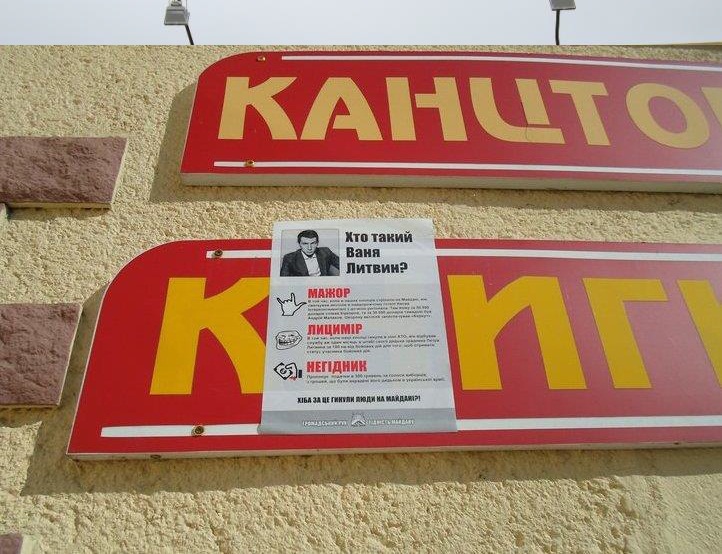
Obstruction of campaigning is committed mainly by the voters. Thus, in Kherson oblast during the visit of the leader of "Strong Ukraine" S. Tihipko to oblast, which was held September 17, 2014 the room in which the politician held meeting with voters, was picketed by representatives of Samooborona and Euromaidan activists, who pelted participants with green paint and eggs. S. Tihipko himself went out through the emergency exit. Similar pickets of campaign events are held against the current people's deputy Volodymyr Saldo, who signed the “dictatorial” laws of January 16, 2014 and is running in constituency № 182. Cases of obstruction of candidates' campaigning were also recorded in Kirovohrad oblast. In particular, there were a number of incidents of physical violence against O.Dovhyy (constituency №102). Eventually, O.Dovhyy was forced to escape repeatedly from disgruntled citizens (for example in Znamyanka, in village Podorozhne of Svitlovodsk rayon of Kirovograd oblast, etc.). On September, 30 in Odesa parliamentary candidate N.Shufrych was beaten and his planned conference disrupted. On October 2, in constituency № 16 voters almost beat parliamentary candidate O.Kalyetnik that during the meeting with voters campaigned for Russia. On September 16, 2014 activists of "Right Sector" threw parliamentary candidate V. Zhuravskyy into the trash, and on September 25, 2014 the same happened to V.Pylypyshyn. In constituency № 137 (Odesa oblast) during meeting of self-nominated candidate Leonid Klimov with voters the activists of "Right Sector" also tried to throw the candidate into the trash.
7. The activities of local authorities on preparation for early elections

In most regions, the activities of local authorities on preparation for elections are not very active and are focused primarily on creating appropriate conditions for electoral commissions' work and for campaigning. For example, in Ivano-Frankivsk and Ternopil oblasts employees of local government that will ensure the activities of PECs were appointed. In Kharkiv oblast, local authorities set stands and boards for posting campaign materials, solve issues related to ensuring the functioning of DECs. In Khmelnytsky oblast local authorities work not only on support of the electoral commission, but on support of the work of the State Voter Register. For the reason of possible power outages authorities in some regions pay increased attention to the problem of uninterrupted power supply for DECs. This recorded, for example, in Kharkiv oblast. In Vinnytsia oblast, local authorities take measures to increase opportunities to vote for people with special needs. Thus, voters who use wheelchairs, can book in Vinnytsia until October 23, 2014 support services and transportation to participate in voting directly in the premises of PEC but not at place of stay. However, these progressive innovations are rather exception than usual practice - in most other regions voters who use wheelchairs are not supported by social services in providing opportunity to vote. The work of the State Voter Register is evaluated by majority of long-term observers of CVU positively. However, the problem of broader information for voters on the procedure of inclusion personal information to the State Voter Register, amendments to this information etc. remains important. This work in some regions is done by local authorities, but informing voters on the order of the State Voter Register is not their direct task. The Law on the State Budget for the coming years should provide appropriate funding for information activities to be performed by the State Voter Register bodies, not by local authorities.
PREVIOUS REPORTS:
THE FIRST LTO REPORT IN ENGLISH
THE FIRST LTO REPORT IN UKRAINIAN

